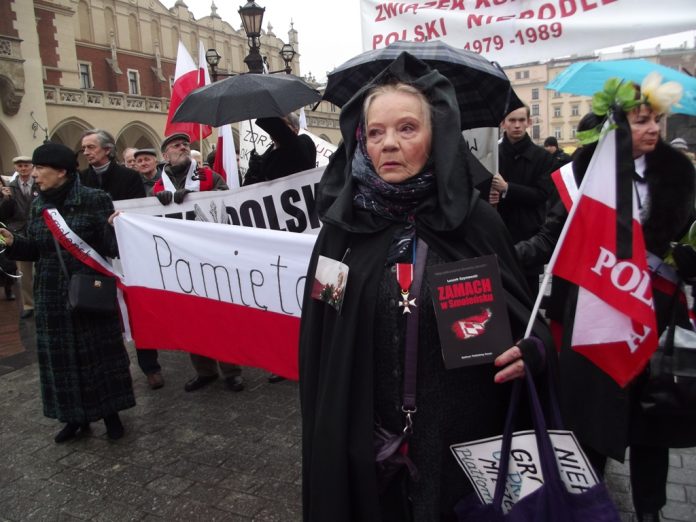The results of the October 13 parliamentary election in Poland did not come as a big surprise. It was pretty much expected that the winner would be the conservative Law and Justice (PiS) party.
What did come as a surprise, however, was that PiS won with a majority of votes (44.6%). Another surprise was the collapse of the opposition Civic Coalition.
The once ruling Civic Platform (PO) – the party of today’s President of the European Council Donald Tusk – was forced into the polls in a desperate coalition with the liberals of Modern (Nowoczesna) and two other very small political parties. The result was a historic defeat for the opposition. It finished second, but only swept 27% of the vote.
This means PiS will be able to form a one-party government with 235 seats in the 460-seat lower house, the Sejm. This also means the PiS government is poised to take control of the judiciary, the media and education, just as Viktor Orbán did in Hungary.
Why is PiS so popular?
There is no doubt the majority of the Polish population supports the party of the controversial figure of Jaroslaw Kaczynski. His party is a mix of primitive nationalism, ultra-conservative approach of the catholic belief. It holds a completely anti-Christian position as regards refugees and migrants. It also expresses many negative attitudes. In brief, PiS is strongly reminiscent of something that comes from the remote past.
However, it managed to keep and augment its forces from the previous elections of 2015.
The main reason for these successes is that PiS invested in fear and exploited as much as possible the possible threat of Islam and Muslim refugees bring to the Polish society.
The majority of media have passed under the control of the government or the influence of the party. Since 2015, a well-orchestrated campaign of brainwashing was launched depicting migrants and refugees as new Asiatic hordes targeting defenceless Christians. TV channels broadcast hours daily videos showing the dramatic arrival of refugees through the Balkans, sensationalised with appropriate music and describing them as angry invaders.
In addition, the party-controlled media disinformed its audience when the European Commission expressed its concern about the breach of the rule of law by the Polish government or when EU member states severely criticised Warsaw for the total absence of solidarity expressed in the refugee issue.
In brief, PiS created a worrisome atmosphere in society, instilling a sense of isolation and betrayal by the other Europeans. This appealed to the darkest side of conservativism in Polish society and, in the end, swept over public opinion.
It is clear the Polish government will continue along the same Eurosceptic and Europhobic path of the previous period, and that this will represent a solid barrier against the aspiration for European Integration and any progressive movement to tackle the crucial issues of our time – climate change, refugee and migration issues, respect of the EU fundamental values etc.
Why did the opposition lose credibility?
It would be unfair to consider PiS succeeded on its own. The Civic Platform and its former leader and former Prime Minister Donald Tusk created the environment for its spectacular rise.
The two consecutive governments led by Donald Tusk between 2007 and 2014 have been described by many political analysts as the worst in the history of the post-communist Poland. Tusk made too many promises to the people and it was impossible to keep them all. Instead of fulfilling a few of the promises, he made a U-turn and forgot all he had said before.
Tusk promised to streamline the bureaucracy, reduce taxes and privatise state-owned companies. But he never cut any taxes. In fact, he increased the value-added tax (VAT), as well as the tax on diesel, alcohol, tobacco and coal. He also cancelled numerous tax exemptions.
As regards the state bureaucracy, this increased massively. What is more, privatisations were followed by severe scandals which Tusk refused to investigate.
On the social level, Tusk supported more or less the same conservative ideas expressed today by the PiS. He appeared ready to support some type of internet censorship, as well as the internet and money transfer operations. He supported the Polish law on abortion, the same one that human rights activists want to abolish. He also expressed support for Orbán’s authoritarian methods.
In what concerns party affairs, Tusk isolated, expelled or annihilated any viable opposition inside the Civic Platform and many valuable politicians abandoned politics, found refuge in Brussels as MEPs or simply accepted minor roles in the party life.
Tusk and his party maintained an arrogant style, which is his specialty since it is a brand characteristic of the majority of Polish politicians, public servants and diplomats.
As a result, society became deeply disenchanted with politicians’ unkept promises. Voters grew tired with the clientelism shown by Tusk’s party and were ready to capitulate to the populist rhetoric of the conservatives.
What is more, after Tusk was elected President of the European Council he continued to control and manipulate party politics. Deep internal divisions and the emergence of inexperienced and inappropriate persons in the leadership of PO followed his intervention.
What this all means is that PiS’ win in the elections should not only be credited to the party’s successful campaigning.
Media manipulation and brainwashing orchestrated by the government met a disoriented opposition, with inadequate leadership and without the capacity to inspire a people that in 1989 was among the most pro-European of the continent.

